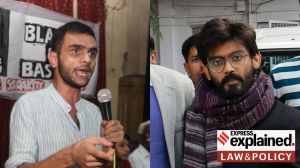145;Libya keen to keep some n-plants146;
The head of the UN nuclear watchdog, who met senior Libyan officials on Monday to discuss the dismantling of Libya8217;s bomb programme, sa...

The head of the UN nuclear watchdog, who met senior Libyan officials on Monday to discuss the dismantling of Libya8217;s bomb programme, said Tripoli wanted to keep some 8216;8216;peaceful use8217;8217; atomic facilities.
In December, Libya said it was renouncing nuclear, chemical and biological weapons and invited US, British and international experts to help it disarm.
Since then, the International Atomic Energy Agency IAEA has overseen the US and British nuclear disarmament process, which has seen sensitive equipment and papers removed to the US. IAEA chief Mohamed ElBaradei, who held talks with Foreign Minister Mohamed Abderrhmane Chalgam on Monday, said Libya did not seem reluctant to dismantle its atomic weapons programme.
But he said Tripoli was keen to keep some 8216;8216;peaceful use8217;8217; nuclear facilities, including a small research reactor. 8216;8216;They the Libyans have been cooperating in removing all the sensitive aspects of their programme. There8217;s still some remaining parts and again discussion is going on to dismantle and remove them,8217;8217; he said ahead of a meeting with Libya8217;s Deputy PM in charge of the nuclear programme, Matoug M. Matoug. The research reactor Libya wants to keep uses highly-enriched uranium HEU fuel. HEU can be used in nuclear weapons. ElBaradei said discussions were underway about converting it to use low-enriched fuel.
8216;8216;They want to keep the research reactor, which is something legitimate, and they would obviously like to expand the peaceful use activities, which the agency would be eager to support once the dismantling of the nuclear arms programme is finished,8217;8217; ElBaradei said.
ElBaradei8217;s visit follows the release on Friday of an IAEA report on Libya8217;s nuclear weapons programme. The report said Libya8217;s atomic effort began as far back as the early 1980s and was much more extensive than previously thought.
8212;Reuters
- 01
- 02
- 03
- 04
- 05































